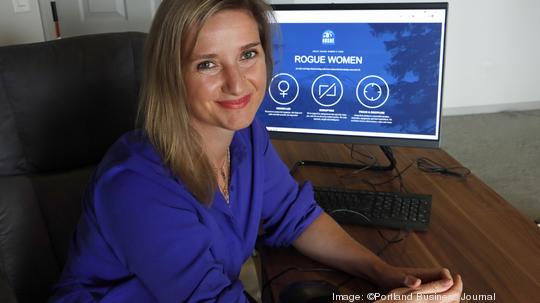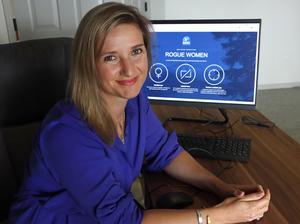
Portland-based Rogue Women’s Fund proved its thesis with Fund I and now Managing Partner Caroline Lewis is raising a hefty Fund II.
Lewis is targeting $30 million for the fund, which had a first close in August. To ensure the fund is available to a wide swath of accredited investors, she has teamed with innovative fund managers at Chicago-based Vitalize Venture Capital and Baltimore-based RareBreed Ventures. The effort aims to help all three funds and make it easier for small investors to participate.
The three funds have created a $10 million special purpose vehicle. Smaller investors can invest in the vehicle, which will turn around and invest equally across the three funds. It’s almost like a fund of funds, except investors know from the outset which three funds will receive the money, Lewis said.
The first Rogue Women’s Fund was $5 million and backed 11 companies. With a new $30 million target, the fund will be able to write bigger checks and support more companies. But the minimum commitment for limited partners also goes up.
“The problem is as the fund gets bigger you can’t take smaller checks because (regulators) put a limit on the number of investors,” Lewis said. “As you get bigger you have to say no to people with smaller checks and they are likely to be women and other underrepresented investors.”
Since she started investing Lewis has been focused not only on getting high returns, but also ensuring that underrepresented founders are backed and just as importantly that the investors reaping those returns are also women and other underrepresented people in the industry.
The managing partners at Vitalize and RareBreed faced the same issue with regard to accepting smaller checks. All three know each other as Kauffman Fellows and discussed their challenges, Lewis said.
For the SPV, investors commit $10,000 a year for four years. The $40,000 commitment is more manageable than the $250,000 to $500,000 typically required for a fund over $10 million.
“There are accredited investors who might be interested (in getting into angel investing) but $250,000 minimum is a high bar, even with it being called over three years,” said Lewis. She added that when she started investing she was proud to have $25,000 set aside for it, but she was told that she couldn’t be an angel investor with such a small amount.
Historically, the rule of thumb for angel investing is that you need to invest in at least 10 companies for a balanced portfolio, and typically that investment is $25,000 in each.
Lewis wants to change that so that more people who have the means could try it. It’s part of her mission to change venture capital and the broader economy.
“It’s not just funding diverse entrepreneurs,” she said, which is a goal of all three funds involved in this SPV. “If you want to change the cycle you have to change the cycle of who makes the returns (from backing those entrepreneurs).”
The SPV is administered by Vitalize and its Managing Partner Gale Wilkinson.
Rogue Women’s Fund II also marks the fund coming into its own. In addition to Lewis the other partners are Adam Stoll and Tom Sperry, who are both partners at Rogue Venture Partners, which helped Lewis incubate this new fund. Lewis said this fund marks bringing Rogue Women’s Fund out from the Rogue Venture Partners umbrella.
“Fund I was proof of concept. Fund II, I want Rogue Women to be an institutionally backed global investment firm,” said Lewis. The fund invests in women-led, early-stage startups in the care economy, women's health, experience tech, and tech that enables access and visibility to those underrepresented in society.
Some other elements that set Rogue Women’s Fund apart are:
- Lewis shares a portion of the general partner carried interest, or the profit she makes as general partner, with the founders that she invests in, making founders investors in the fund as well.
- The fund takes a portion of the management fee and pays for a professional leadership coach, a family stipend and a financial coach for founders.
- Lewis wants half the limited partners to be women or non-binary people, something that was achieved in Fund I.
“We are a whole person investor. We want the highest returns but at the end of day you can get higher returns by investing in the whole person and recognizing people are more than just being a founder,” she said.






